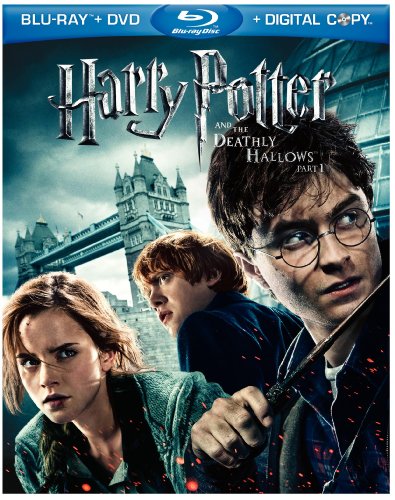
For the past nine years, fans have been watching Harry Potter’s story unfold on the screen, eagerly anticipating the boy wizard’s next big adventure. When they first hit theaters, though, the films were seen as a family-friendly phenomenon—action-packed stories about magical kids at a magical school. But what started out as a fun kids’ series with 2001’s Harry Potter and the Sorcerer’s Stone became increasingly darker and more intense as Harry and his friends (and their fans) grew and matured. As the series continued, it became more than just a bunch of fun kids’ movies. Now, with the release of the first part of the series conclusion, Harry Potter and the Deathly Hallows, it’s become truly epic.
From the beginning, it’s clear that things have changed for the no-longer-really-a-boy wizard and his friends. Instead of anxiously awaiting the start of their seventh and final year at Hogwarts—one last year of classes, Quidditch matches, teen crushes, and maybe a little bit of adventure—Harry (Daniel Radcliffe), Ron (Rupert Grint), and Hermione (Emma Watson) are preparing for a dangerous journey. Lord Voldemort (Ralph Fiennes) has gotten stronger, and his Death Eaters now control both Hogwarts and the Ministry of Magic.
The only way to defeat Voldemort is to find the Horcruxes that contain the remaining parts of his dark soul and destroy them. But Harry and his friends are in grave danger—so they’re forced to go into hiding while they try to figure out what Professor Dumbledore expected them to do.
As the series approaches its final showdown, this seventh installment is appropriately grim and foreboding—and, as in the first part of the final book (see my review), the characters’ world-weariness is, at times, exhausting. After all, things are no longer safe at Hogwarts, and they can no longer depend on the wisdom and guidance of their beloved headmaster—so Harry and his friends spend most of the movie in a holding pattern, hiding out in the woods, discussing what they should do next. There’s a lot of doubt and plenty of bickering as the suspense continues to build.
Fortunately, there’s more to Deathly Hallows than three kids sitting around in the woods, moping and arguing (for that, you’d need to watch a Twilight movie instead). Director David Yates and writer Steve Kloves keep the film moving at a brisk pace, capitalizing on the escalating feeling of doom and filling the film with bursts of action, while seasoning the story with the occasional hints of humor and even a touch of young love.
Admittedly, though, very little happens in this 146-minute adventure. There aren’t any major, game-changing battles, and the characters don’t really grow or mature along the way. In fact, Deathly Hallows probably could have been made into one single grand finale without losing much (except, of course, millions of dollars). But this first part is still surprisingly intense and well-paced. It’s a exhilarating adventure that will keep fans gripping their armrests in suspense until the end—and anxiously awaiting next summer’s conclusion.
Blu-ray Review:
The special features menu on the Blu-ray release of Harry Potter and the Deathly Hallows, Part 1 lists only two items. But don’t let that fool you—because, like the magical tent that Harry, Ron, and Hermione take on their journey into the forest, the film’s features are a whole lot more substantial than they look.
The main feature is the Maximum Movie Mode—a kind of video commentary track that houses almost all of the film’s extras. Though the movie itself usually plays somewhere in the background (and occasionally in the foreground), the focus is more on providing fans with behind-the-scenes footage and other making-of tidbits. Throughout this nearly three-hour feature, you’ll get to see deleted scenes, learn more about things like set design and makeup, and watch the actors interacting outside the movie. You can also choose to watch six additional (and optional) Focus Points, which are also featured separately, on the disc’s special features menu. It’s hard to say why these six featurettes are accessible from the menu while you can only see others if you watch the Maximum Movie Mode—but if you’d like to get just a quick glimpse behind the scenes (without investing three hours into the main feature), the Focus Points give you that option.
The Maximum Movie Mode is definitely loaded with interesting extras and behind-the-scenes footage—and diehard fans probably won’t even think twice about sitting through all three hours, eager to get the inside scoop on their favorite movies. Really, if you have the time, it’s worth a look. Still, it would be nice to have more options—to be able to choose the features that you’re most interested in watching (beyond the six Focus Points).





